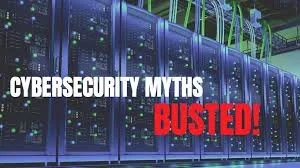"Top 5 Cybersecurity Myths Small Businesses Need to Stop Believing NOW!"
In our last blog post, we discussed why small and medium businesses (SMBs) are prime targets for cyberattacks. Unfortunately, many SMB owners still fall for common misconceptions about cybersecurity, which can leave their businesses vulnerable. In this post, we’ll debunk some of the most prevalent cybersecurity myths and explain why protecting your business is crucial.
Myth #1: “My Business Is Too Small to Be a Target”
Many small business owners believe hackers only go after large companies with vast amounts of valuable data. In reality, 43% of cyberattacks target small businesses (https://www.verizon.com/business/resources/reports/dbir/). Cybercriminals know that smaller businesses often lack the resources and security infrastructure to protect themselves, making them easier targets.
The Truth: Every business, regardless of size, holds valuable information like customer data, payment details, and intellectual property. Hackers are after quick wins, and small businesses provide easy opportunities.
Myth #2: “Cybersecurity Is Too Expensive for My Business”
A common assumption is that implementing robust cybersecurity measures is too costly for small businesses. However, 60% of small businesses close within six months of a cyberattack because the financial burden of recovering from an attack often exceeds the cost of prevention (https://staysafeonline.org/resource/2021-cybersecurity-awareness-month-facts/).
The Truth: Many cybersecurity solutions are affordable and scalable to fit your needs. Simple, effective strategies like using multi-factor authentication (MFA), securing backups, and investing in managed security services can protect your business without breaking the bank.
Whatever it is, the way you tell your story online can make all the difference.
Myth #3: “I Don’t Handle Sensitive Data, So I Don’t Need to Worry”
Even if your business doesn’t deal directly with highly sensitive data like healthcare records or credit card numbers, you’re still at risk. Data breaches often involve personal information like customer names, email addresses, and phone numbers, which can be used in identity theft and phishing attacks (https://www.ibm.com/security/data-breach).
The Truth: All businesses collect and store data that hackers can exploit. From employee records to supplier information, any data breach can have serious financial and reputational consequences.
Myth #4: “I Trust My Employees Not to Make Mistakes”
Even with the best intentions, employees are often the weakest link in a company’s cybersecurity defense. Human error accounts for over 90% of successful breaches, with phishing attacks and weak passwords leading the way (https://www.cybintsolutions.com/cyber-security-facts-stats/)
The Truth: Regular employee training and awareness are critical to minimizing risks. Simple mistakes, like clicking on malicious email links or using weak passwords, can devastate your business. Implementing employee cybersecurity training and enforcing strong password policies can make a huge difference.
Myth #5: “Antivirus Software Is Enough”
Relying solely on antivirus software is like locking only the front door of your house while leaving all the windows wide open. While antivirus programs are an important layer of protection, they can’t protect you from everything.
The Truth: Cybersecurity is about a multi-layered approach. In addition to antivirus software, you need firewalls, intrusion detection systems, data encryption, and secure backups. A comprehensive defense strategy, including proactive threat monitoring, is the best way to safeguard your business from multiple angles.
What You Can Do to Protect Your Business Today
Now that we’ve debunked these common myths, what practical steps can you take to strengthen your business’s defenses?
1. Conduct a Cybersecurity Audit: Identify where your business is most vulnerable. A cybersecurity audit can help you understand your current risks and how to address them.
2. Invest in Employee Training: Phishing scams rely on human error. Educate your employees to spot potential scams and understand the importance of cybersecurity practices.
3. Partner with a Managed Security Service Provider (MSSP): If managing your own cybersecurity seems overwhelming, partnering with an MSSP like us can provide expert protection and monitoring at a fraction of the cost of in-house security.
4. Stay Updated: Cyber threats are constantly evolving, and so should your defenses. Make sure you regularly update your systems, software, and security protocols to stay ahead of potential risks.
Conclusion
Cybersecurity myths can lead to dangerous complacency. Believing that your business is too small to be attacked or that your current defenses are enough can leave you vulnerable to many threats. By taking simple, proactive steps, you can protect your business, your customers, and your reputation from the costly impacts of a cyberattack.
If you’re ready to take the next step in securing your business, contact us for a comprehensive cybersecurity solution tailored to your needs.
Sources:
1. Verizon, "[2020 Data Breach Investigations Report](https://www.verizon.com/business/resources/reports/dbir/)"
2. National Cyber Security Alliance, "[2021 Cybersecurity Awareness Month Facts](https://staysafeonline.org/resource/2021-cybersecurity-awareness-month-facts/)"
3. IBM, "[Cost of a Data Breach Report 2021](https://www.ibm.com/security/data-breach)"
4. Cybint Solutions, "[Cyber Security Facts and Stats](https://www.cybintsolutions.com/cyber-security-facts-stats/)"







